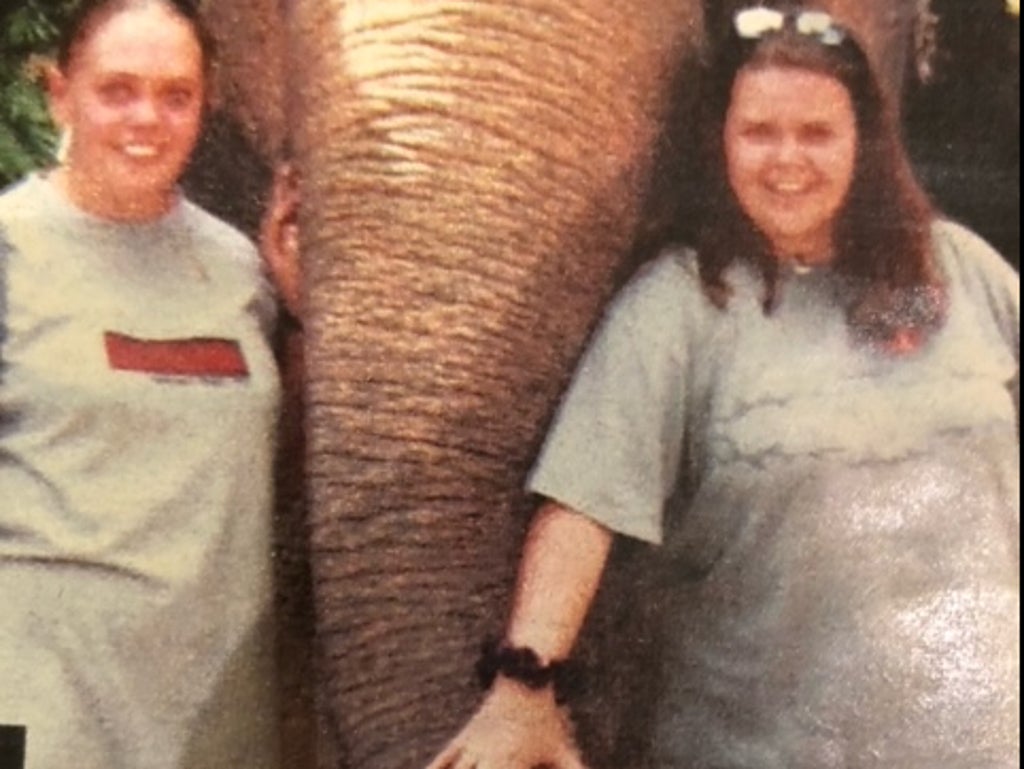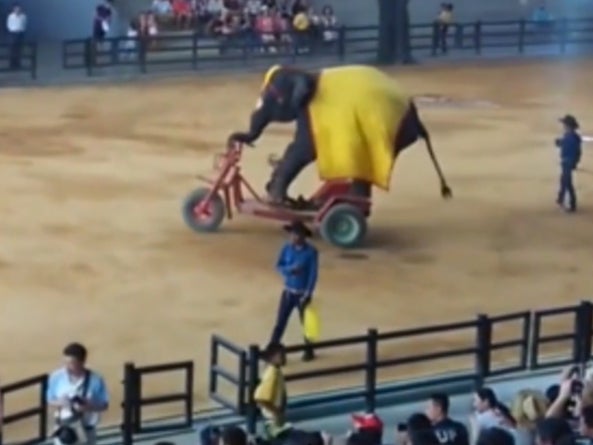
The sister of a woman killed by a tortured elephant in Thailand says she is disgusted the government has apparently axed plans to ban adverts for foreign holidays involving cruel animal entertainment.
Experts say at least 119 UK travel companies are still promoting Nong Nooch, where Andrea Taylor, 20, died in 2000 when she was attacked by an elephant that charged at audience members watching the animals perform.
Earlier this year the government stalled – and appeared to ditch – its Animals Abroad Bill, which would have included a ban on adverts for such venues, mostly in Asia.
That is despite having promised a ban in last year’s Animal Welfare Action Plan, which ministers vaunted as groundbreaking when they launched it.
Helen Costigan said the reported shelving of the Bill, thought to be down to opposition from parts of the Conservative Party, was “disgusting”.
The Independent has been told the ban on adverts had been agreed in cabinet before the government U-turn.
Now, the prime minister’s father has called for the government to introduce a ban in the Queen’s speech next month.
After a poll for Save the Asian Elephants (Stae) organisation found that 85 per cent of people who expressed a view backed a ban, Stanley Johnson called for ministers to legislate, condemning “this scourge on the world’s most revered species which places them in deep peril of survival, and of the role UK tourism plays in this”.
Through Stae, Ms Costigan has asked three times in the past two years for a meeting with Boris Johnson but has not had a response.
“We’ve come a long way since 22 years ago but there are still people out there who don’t understand the dangers and the abuse that the animals receive and how they get broken,” she told The Independent.
“Trying to get people to understand how dangerous these places are and how the elephants are beaten isn’t easy.”
“The government needs to address the opinions of everyone, not just look after themselves,” she said. “Our appeals seem to be falling on deaf ears.”
At the same time, a leaked letter from the government to another voter about the possible Bill failed to commit to introducing the promised ban, instead putting the onus on tourist research before travelling.
“Holidaymakers should be encouraged to do research and be informed to make the right choices that benefit wildlife. When booking a holiday, shoppers might wish to ask questions about the kinds of attractions they are being offered,” the letter says.
Ms Costigan was angry. “It’s very much a brush-off,” she said. “How do holidaymakers know if you don’t tell them?
“When we went to Thailand we didn’t understand the dangers to us or the abuse elephants face. For a normal person going on holiday, asking whether it’s ethical is not at the forefront of their mind.
“Travel companies are making a fortune from these places.
“We didn’t know to do any research, and my sister came home in a coffin.”
Thousands of people a year visit attractions featuring elephant rides or entertainment.

Behind the scenes, to force the animals to take people on their backs, play football or perform tricks, “trainers” often chain, brutally whip and stab the animals with sharp hooks. The elephants then learn to obey commands out of fear of pain.
Stae says it has identified at least 1,200 companies in the UK market still advertising 277 overseas venues where such treatment occurs.
The Costigan sisters were on holiday with their father celebrating his taking voluntary redundancy when the accident happened.
Andrea was gored so badly that in the moments afterwards she said she could not feel her legs and thought she was going blind. She died in surgery within hours.
Ms Costigan also nearly died when she was gored in the abdomen.
She said that when she now goes on holiday with her husband and children, aged six and seven, they studiously avoid all venues with captive animals, including hotels with dolphins in pools.
Duncan McNair, chief executive of Save the Asian Elephants, said the government letter was misleading, describing it as “a throwback to what I believe we have already agreed is not the government’s position on protecting Asian elephants”.
He added: “More importantly, the notion that the job will be done by encouraging holidaymakers to ask questions and ‘be informed to make the right choices that benefit wildlife’ has been laid to rest by the British public as without meaning.”
Mr McNair said that over the past few years the government had blamed the general election, Brexit, the pandemic and lack of parliamentary time for not introducing a ban.
A source has told The Independent the measures in the Bill were still government policy but discussion at political level was ongoing over the exact content.
Stanley Johnson said: “We must urge our government to respond now to the nation’s call for a ban in the coming parliamentary session, and to help steer the market to an ethical future while time remains for them.”
A government spokesperson said: “We have been working with the Association of British Travel Agents to encourage them to make their customers aware of reported issues around Asian elephants.”
After the tragedy, the park put up barriers in front of the audience, but the elephant went on being part of the tourist shows.

The family spent several years pursing a court case and civil action against the park, and were awarded a small sum in damages, which was largely swallowed up by costs.
Conservationists say the life of elephants caught from the wild for tourism is hell: babies separated from their mothers are put through pain for the rest of their lives.
“You can see in their eyes and how they sway their heads that they’re in pain and distress,” Ms Costigan said.
“Never mind that the park shouldn’t have been there, but the elephant shouldn’t have been there.
“The elephant was a male in season and when they’re in season they extrete a clear fluid from a gland on the side of their head. We think when the mahoot jumped on the elephant’s head he knocked its gland, which made it irate and charge at us.
“We think the park have learnt to keep male elephants back from performances when they’re in season.”
She suggested travel insurers include disclaimers that they would not cover injuries if holidaymakers ride elephants or attend shows based on cruelty.
Ms Costigan, 45, said her sister was very outgoing and had she survived, she would have campaigned to educate people about animals kept captive abroad.
“Andrea didn’t get to come home. She came home in a coffin,” she told actor Peter Egan in an interview for Stae.
“I’d love them to watch the videos of the elephant abuse. I’d love for that person to have a proper understanding and education of what they’re trying to inform the UK public about.”
If she could speak to Mr Johnson, she told The Independent her message would be “What’s the hold-up? Why is it acceptable for British voters to go abroad and be killed?”







